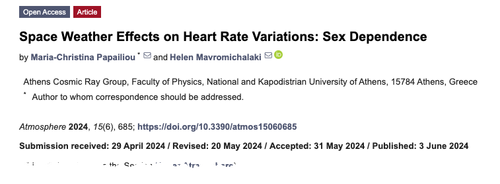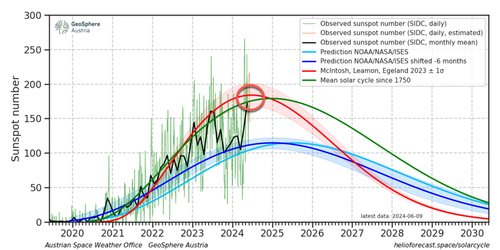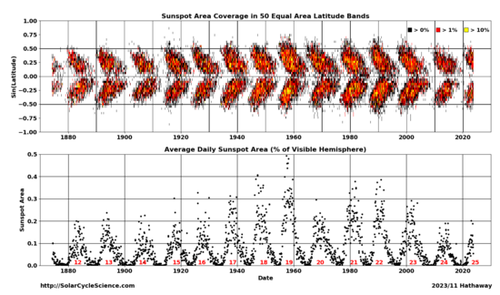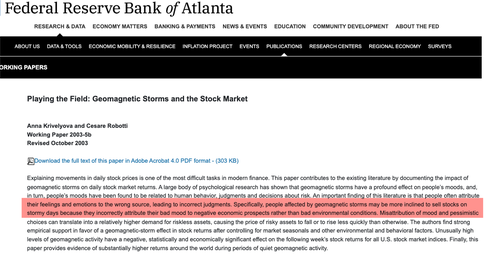
A new study finds that space weather, such as solar storms, impacts heart rate variations in women more than men. This research emerges just as Solar Cycle 25 has entered a maximum period, bringing a surge in solar activity such as sunspots, solar flares, and more frequent auroras. Notably, just a month ago, Earth was hammered by one of the most powerful solar storms in decades.
Maria-Christina Papailiou and Helen Mavromichalaki from the National and Kapodistrian University of Athens led the study titled "Space Weather Effects on Heart Rate Variations: Sex Dependence." They found that space weather affects heart rate variations in men and women.
Researchers analyzed heart rate measurements and geomagnetic activity data of 687 men and 534 women in Greece from 2011 to 2018.
The key findings of the report, published in Atmosphere, a peer-reviewed open-access journal of scientific studies, were:
- Women are more sensitive to changes in space weather than men.
- Geomagnetic activity affects heart rate, with significant changes noticed before and after geomagnetic storms.
- No significant heart rate changes were observed for cosmic ray variations.
"Results revealed that women tend to be more sensitive to physical environmental changes. Statistically significant results are related to the geomagnetic activity but were not obtained for cosmic ray variations," the researchers said.
Solar Cycle 25 has entered a maximum period.
Here's a more extended timeframe for Solar Cycles.
Space Weather News' Ben Davidson was the first to point out the study in a daily update of space weather news.
Solar Storm Coming, Impact to Heart and Cancer: pic.twitter.com/lJ71xxkndB
— SpaceWeatherNews (@SunWeatherMan) June 9, 2024
Two decades ago, the Federal Reserve Bank of Atlanta wrote a paper titled "Playing the Field: Geomagnetic Storms and the Stock Market," outlining that "people affected by geomagnetic storms may be more inclined to sell stocks." However, stocks are mostly traded by algos in today's market...
The impact of space weather on human health is far more significant than most people realize.
A new study finds that space weather, such as solar storms, impacts heart rate variations in women more than men. This research emerges just as Solar Cycle 25 has entered a maximum period, bringing a surge in solar activity such as sunspots, solar flares, and more frequent auroras. Notably, just a month ago, Earth was hammered by one of the most powerful solar storms in decades.
Maria-Christina Papailiou and Helen Mavromichalaki from the National and Kapodistrian University of Athens led the study titled “Space Weather Effects on Heart Rate Variations: Sex Dependence.” They found that space weather affects heart rate variations in men and women.
Researchers analyzed heart rate measurements and geomagnetic activity data of 687 men and 534 women in Greece from 2011 to 2018.
The key findings of the report, published in Atmosphere, a peer-reviewed open-access journal of scientific studies, were:
- Women are more sensitive to changes in space weather than men.
- Geomagnetic activity affects heart rate, with significant changes noticed before and after geomagnetic storms.
- No significant heart rate changes were observed for cosmic ray variations.
“Results revealed that women tend to be more sensitive to physical environmental changes. Statistically significant results are related to the geomagnetic activity but were not obtained for cosmic ray variations,” the researchers said.
Solar Cycle 25 has entered a maximum period.
Here’s a more extended timeframe for Solar Cycles.
Space Weather News’ Ben Davidson was the first to point out the study in a daily update of space weather news.
Solar Storm Coming, Impact to Heart and Cancer: pic.twitter.com/lJ71xxkndB
— SpaceWeatherNews (@SunWeatherMan) June 9, 2024
Two decades ago, the Federal Reserve Bank of Atlanta wrote a paper titled “Playing the Field: Geomagnetic Storms and the Stock Market,” outlining that “people affected by geomagnetic storms may be more inclined to sell stocks.” However, stocks are mostly traded by algos in today’s market…
The impact of space weather on human health is far more significant than most people realize.
Loading…









